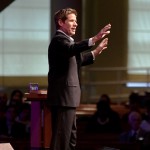Business opportunities: always
 Business opportunities always exist. During the depths of the great depression, there were entrepreneurs who saw great opportunity and in fact, became wealthy.
Business opportunities always exist. During the depths of the great depression, there were entrepreneurs who saw great opportunity and in fact, became wealthy.
The trick is to look at the environment from a different angle. I heard a speech by famed quarterback Peyton Manning who said his job was to scan the field and see things that others don’t. Things such as where the safeties are lined up, and call an audible when prudent.
As a business leader, that’s your job as well.
Think all opportunities are gone? Read these quotes from the past:
- “Everything that can be invented has been invented.” Charles Duell, US Patent Office, 1899
- “The horse is here today, but the automobile is only a novelty-a fad” President of Michigan bank advising against investment in Ford.
- “What use could this company make of an electric toy?” Western Union turning down rights to the telephone.
When I was in the US Coast Guard, I had a chief electronic technician tell me, “This solid state stuff is not here to stay. Concentrate on tubes”
Do you get the pattern? Many, if not most, people fail to see trends and the opportunities they present. J. Paul Getty put his inheritance at great risk by buying depressed oil stocks when everyone else was dumping them. When the great depression ended and oil prices rose, he became a billionaire.
It’s not always true of course, that going the opposite direction of everyone else is a winner. But, in most cases, that is what winners do. The trick is to spot opportunities others are running away from.
Many business people fall into the trap of nostalgically longing for past times. “Things were great in the 90’s.” Well, the nineties are gone, and we live in what is the new normal. If you’re going to be successful, you must do it in the environment of now, not the past.
Change simply for change’s sake is a disaster. But, not adapting to a changing business environment is suicide.
Former GE Chairman Jack Welch said, “I am convinced that if the rate of change inside an organization is less than the rate of change outside, the end is in sight.”
For almost all businesses, whether you will change isn’t the question. You almost certainly will. But, will it be a healthy controlled change, or will it be a very unhealthy change forced on you by the market?
Businesses today face a rate of market change that is probably unparalleled. When I started my career, almost no one owned a computer. Now, about 85% percent of American households own at least one. The internet has grown even more rapidly, transforming almost all of modern life.
Not all changes are positive, in fact, many are frighteningly negative. But, the smart business person, like a good quarterback, looks over the heads of the team lined up against him and spots the holes.
Here are some examples.
- During hard economic times, companies tend to pull back on capital spending, but spend more on selected services such as maintaining their equipment. This presents great business opportunities to the discerning.
- With the increased cost of an employee, companies are outsourcing jobs they would have done in house in the past. Think opportunity.
- History shows us that during hard times, the entertainment industry flourishes.
- There are recession proof industries, like water and waste water treatment. Do you suppose that people flush their toilets less during bad times? (just to be clear.. they do not)
- China recently ended its atrocious one child per family rule. Aside from ending a morally reprehensible practice, it’s going to result in a huge baby boom, possibly the largest in history. For the smart entrepreneur, that should look like an opportunity.
Here’s one tried and true way of anticipating change. Ask your customers. What new needs do they have, that they didn’t have a few years ago? And since you’re the great business leader, why shouldn’t they use you to fulfill those needs?
Eddie Mayfield
Grow or Die? Sometimes..
 All of us have heard the mantra, “you’re either growing or dying.” But, is that always true?
All of us have heard the mantra, “you’re either growing or dying.” But, is that always true?
I have a good friend, a very successful businessman, who recently turned down a big order he’d been offered. When I asked “why,” he said an order of that size would completely change the culture of his business, and he wasn’t going to allow it.
This individual has started two high technology businesses. One grew into a large public company. After leaving there, he formed another smaller but highly successful company, which he wants to keep relatively small. Having tasted the world of running a large company, he’s determined that it’s not what he wants from life.
Another friend started a successful business from his home, and has purposely not hired anyone else, despite the fact that he could do more business if he did.
Both of these gentlemen have clear visions of what they want their businesses to be, are successful and respected people in their fields, and have built impressive businesses. So, are they dying by not growing?
I used to pay close attention to the famous “Inc 500” listed companies. But, I noticed something odd; many of the companies listed, were bankrupt or out of business shortly afterwards. Keep in mind, that the Inc 500 is a listing of the most rapidly growing privately held businesses in the United States.
So how, could a rapidly growing business go broke? The answer.. very easily.
Edward D. Hess, a professor at the University of Virginia’s Darden Graduate School of Business says that the idea of “grow or die” is just not supported by research. In fact, he says that growth can kill a business.
Professor Hess is not against growth, but says that growth should be approached as a well considered decision, not as an automatic assumption.
Rapid growth can overwhelm processes, people, and controls. Hess recommends staged growth, where you accelerate, and then let off the pedal while the company catches up. This is especially true for small businesses that lack a safety net to survive unanticipated problems.
Early in my career, I worked for a rapidly growing company where we were actually told NOT to accept any additional customers. Think about that for a moment, do NOT accept new customers!
I was not in management at that time, but the company had expanded so rapidly, that we were doing a terrible job servicing the customers we had. So much so, that our reputation in the market was being damaged. Additionally, employees were so overworked and stressed that turnover rates were horrible . The owners decided to take bold action to pause the growth.
The company survived , and became quite large and successful.
Hess says there are four methods of business growth for a small company. You can improve, innovate, scale, or acquire. Innovation and acquisitions are relatively high risk methods.
He suggests scaling, which simply means doing more of what you’re already doing. For any of you that run businesses, you’re already thinking that’s easier said than done. And, you’re right.
It means that you must improve your processes, hire the right people, and train them well. All of which takes considerable energy and time.
I always tell people to play the “what if we’re successful” game. You want to double your business; so visualize what the business will look like if you’re successful. It probably means you need more people, right? Do you enjoy hiring and managing people? Better think that through.
It may mean incurring debt to finance the growth; are you comfortable with that? It could well mean that the vacations you’re taking, the golf you enjoy, and the relaxed atmosphere at the office will all go away. You up for that?
Larger companies require that controls be pushed away from just one person. Can you delegate authority to others? Really?
I’m not discouraging growth. I’ve been fortunate enough to both work for, and own a rapidly growing business. What I do suggest, is that you take a hard look at what you really want from life, and make growth a rational decision, not an assumption.
Speaking of growth, the Harvard Business Review in 1983 published “The Five Stages of Business Growth,” which I’ve found helpful.
The stages are:
- Existence
- Survival
- Success
- Take Off
- Resource Maturity
The Existence Stage is just that. “Hey, we’re in business.” The problem you face is finding customers and delivering. The big question is: “can we get enough customers to be viable?”
The strategy is to.. well, exist. Not much more than that. Anyone that’s been through founding a small business understands this stage. Some make it out, some do not.
The Survival Stage is where the business has proven that it’s viable. It has enough customers and does good enough work to keep them. The key problem has shifted from just existing, to keeping revenues and expenses in order. One question asked during this phase is “can we generate enough cash flow to stay in business, and finance growth to a more comfortable stage?” Some business remain in this stage for their entire life. These are the Mom and Pop type stores.
The Success stage is more comfortable, but even here the owner has some strategic decisions to make. Do they use the company’s success as a platform to greater growth, or simply maintain it in a comfortable level. I’ve seen people do both successfully.
The Take OFF stage is the high growth stage. The problems are maintaining enough cash to run and grow, and for some people, this means taking on considerable debt. Many people find that very uncomfortable.
This is also where some hard decisions come up regarding leadership and management. What got you here, isn’t necessarily going to get you higher. Many founders find themselves pushed out by creditors at this stage, or face the hard reality and remove themselves from management.
Companies either make it higher, or fall back to either the success or survival stage. Life is risky here.
The final Resource Maturity level is the big company level. This is where my friend found himself, and he didn’t like it. His experience is not uncommon.
One of the challenges at this level is to maintain an entrepreneurial spirit, while consolidating gains, and adding personnel and leadership levels.
So, what’s the bottom line… grow or not?
The good news is- you get to decide. Just make it a rational decision, not an automatic assumption.
Eddie Mayfield
Grow or Die.. is that true?
 All of us have heard the mantra, “you’re either growing or dying.” But, is that always true?
All of us have heard the mantra, “you’re either growing or dying.” But, is that always true?
I have a good friend, a very successful businessman, who recently turned down a big order he’d been offered. When I asked “why,” he said an order of that size would completely change the culture of his business, and he wasn’t going to allow it.
This individual has started two high technology businesses. One grew into a large public company. After leaving there, he formed another smaller but highly successful company, which he wants to keep relatively small. Having tasted the world of running a large company, he’s determined that it’s not what he wants from life.
Another friend started a successful business from his home, and has purposely not hired anyone else, despite the fact that he could do more business if he did.
Both of these gentlemen have clear visions of what they want their businesses to be, are successful and respected people in their fields, and have built impressive businesses. So, are they dying by not growing?
I used to pay close attention to the famous “Inc 500” listed companies. But, I noticed something odd; many of the companies listed, were bankrupt or out of business shortly afterwards. Keep in mind, that the Inc 500 is a listing of the most rapidly growing privately held businesses in the United States.
So how, could a rapidly growing business go broke? The answer.. very easily.
Edward D. Hess, a professor at the University of Virginia’s Darden Graduate School of Business says that the idea of “grow or die” is just not supported by research. In fact, he says that growth can kill a business.
Professor Hess is not against growth, but says that growth should be approached as a well considered decision, not as an automatic assumption.
Rapid growth can overwhelm processes, people, and controls. Hess recommends staged growth, where you accelerate, and then let off the pedal while the company catches up. This is especially true for small businesses that lack a safety net to survive unanticipated problems.
Early in my career, I worked for a rapidly growing company where we were actually told NOT to accept any additional customers. Think about that for a moment, do NOT accept new customers!
I was not in management at that time, but the company had expanded so rapidly, that we were doing a terrible job servicing the customers we had. So much so, that our reputation in the market was being damaged. Additionally, employees were so overworked and stressed that turnover rates were horrible . The owners decided to take bold action to pause the growth.
The company survived , and became quite large and successful.
Hess says there are four methods of business growth for a small company. You can improve, innovate, scale, or acquire. Innovation and acquisitions are relatively high risk methods.
He suggests scaling, which simply means doing more of what you’re already doing. For any of you that run businesses, you’re already thinking that’s easier said than done. And, you’re right.
It means that you must improve your processes, hire the right people, and train them well. All of which takes considerable energy and time.
I always tell people to play the “what if we’re successful” game. You want to double your business; so visualize what the business will look like if you’re successful. It probably means you need more people, right? Do you enjoy hiring and managing people? Better think that through.
It may mean incurring debt to finance the growth; are you comfortable with that? It could well mean that the vacations you’re taking, the golf you enjoy, and the relaxed atmosphere at the office will all go away. You up for that?
Larger companies require that controls be pushed away from just one person. Can you delegate authority to others? Really?
I’m not discouraging growth. I’ve been fortunate enough to both work for, and own a rapidly growing business. What I do suggest, is that you take a hard look at what you really want from life, and make growth a rational decision, not an assumption.
Speaking of growth, the Harvard Business Review in 1983 published “The Five Stages of Business Growth,” which I’ve found helpful.
The stages are:
- Existence
- Survival
- Success
- Take Off
- Resource Maturity
The Existence Stage is just that. “Hey, we’re in business.” The problem you face is finding customers and delivering. The big question is: “can we get enough customers to be viable?”
The strategy is to.. well, exist. Not much more than that. Anyone that’s been through founding a small business understands this stage. Some make it out, some do not.
The Survival Stage is where the business has proven that it’s viable. It has enough customers and does good enough work to keep them. The key problem has shifted from just existing, to keeping revenues and expenses in order. One question asked during this phase is “can we generate enough cash flow to stay in business, and finance growth to a more comfortable stage?” Some businesses remain in this stage their entire life. These are the Mom and Pop type stores.
The Success stage is more comfortable, but even here the owner has some strategic decisions to make. Do they use the company’s success as a platform to greater growth, or simply maintain it in a comfortable level? I’ve seen people do both successfully.
The Take OFF stage is the high growth stage. The problems are maintaining enough cash to run and grow, and for some people, this means taking on considerable debt. Many people find that very uncomfortable.
This is also where some hard decisions come up regarding leadership and management. What got you here, isn’t necessarily going to get you higher. Many founders find themselves pushed out by creditors at this stage, or face the hard reality and remove themselves from management.
Companies either make it higher, or fall back to either the success or survival stage. Life is risky here.
The final Resource Maturity level is the big company level. This is where my friend found himself, and he didn’t like it. His experience is not uncommon.
One of the challenges at this level is to maintain an entrepreneurial spirit, while consolidating gains, and adding personnel and leadership levels.
So, what’s the bottom line… grow or not?
The good news is- you get to decide. Just make it a rational decision, not an automatic assumption.
Eddie Mayfield
Winding Career Paths to Success
 When our daughter Rebecca was a little girl, she used to say she wanted to be either a waitress at Sonic, or a Doctor. While the career choices for most of us aren’t quite that disparate, they rarely follow a straight line either.
When our daughter Rebecca was a little girl, she used to say she wanted to be either a waitress at Sonic, or a Doctor. While the career choices for most of us aren’t quite that disparate, they rarely follow a straight line either.
Steve Jobs gave the commencement address at Stanford in 2005. In the audience was author Cal Newport, who wrote about it later in his book “So Good they can’t ignore you.”
Per Newport, Jobs offered the following advice: “You’ve got to find what you love. The only way to do great work is to love what you do. If you haven’t found it yet, keep looking and don’t settle.” Jobs received a standing ovation.
Upon examination of Jobs’ early career however, Newport found that he had not followed the advice he gave the Stanford graduates. Newport concluded that “follow your passion” might in fact, be terrible advice.
Back to Steve Jobs for a bit. Jobs started his collegiate education at Reed College in Oregon. Hardly a great student, he was not especially interested in either business or technology. He studied Western history and dance.
He dropped out after his first year, but stayed on campus, more or less living the life of a bum. He finally moved back home to California with his parents, and took a job with Atari. After becoming preoccupied with a nearby commune, he left that job, spent several months wandering through India, and upon his return, started training at the Los Altos Zen Center.
Jobs’ techie friend, Steve Wozniak was hired by a computer time sharing company to design an interface for clients. Wozniak talked them into hiring his friend Steve to assist. Shortly afterwards, Jobs left for a season to spend time at a commune, not telling his boss that he was going. Evidently, Jobs was surprised upon his return to learn that he’d been fired.
This is hardly the picture of the intensely passionate, driven business guru that is Jobs’ legacy. In fact, it’s a picture of a distracted, undisciplined, unmotivated and directionless individual.
Things changed later that year when Jobs noticed that the local techies were buying computer kits and assembling them at home. He and Wozniak decided that Wozniak could build the circuit boards for $25, and they could sell them for $50. They figured they could net a thousand bucks doing this. They viewed this strictly as a short term way to land some cash.
When Jobs talked to the store owner however, he wasn’t interested in the circuit boards, but told them IF they could build an assembled computer, he’d pay $500 each. Jobs and Wozniak jumped at this chance to make a few more bucks. Neither of them saw it as a long term venture.
But, from that was birthed Apple Computer.
Had Steve Jobs followed the advice he gave at Stanford, he would probably have become an instructor at the Zen Center, because as best anyone can tell, that was his passion and love.
Few of us have been as materially successful as Steve Jobs, but like him, most of our career paths have unexpected and even irrational turns. And most of us have become passionate about our career and business, only after being in it.
It’s fair to say, that Steve Jobs had no passion for business and technology until he was in the business of technology.
I have enjoyed some success in business, most of it in the electronic motor drive business. Until in my late twenties, I didn’t even know such a career existed. In the late seventies I found myself unemployed, and grabbing at every job straw I could find.
A young and growing electronic motor drive company in Texas hired me from Alabama, because during the oil boom of that time, they had a difficult time hiring anyone in Texas. It was an ideal training ground for later founding my own company in Georgia. It wouldn’t have happened otherwise.
Seemingly disconnected events like that are more common in successful careers than one may expect. As a Christian, I actually view these events as God’s hand on my life.
Newport laments that what he terms the “passion hypothesis” has permeated career advice and perceptions. The problem is, once you get past the bumper sticker slogans about “follow your dreams” the research indicates that success, job satisfaction and happiness often have little to do with that.
One reason is that we, perhaps inadvertently, assign some career paths higher scores than others. Stanford Professor John Krumboltz notes that when he meets people, they immediately respect him because he is a Stanford professor. They have no idea if he does a good job or not, just the fact that he’s a professor carries great weight.
This mindset works against job satisfaction and happiness. I have a friend, who is a physician. He confided in me years ago that he hated his job. I was taken aback, and questioned him. “There are people that would die to have your job, how can you possibly hate it?”
But Doctor carries great respect doesn’t it?
Most people, unfortunately, spend more time deciding which smart phone to purchase, than they do planning their career. Truthfully, most of us, at the young age we face these decisions, are poorly equipped to make them. Therefore, career dreams and aspirations can be not only illogical, but actually detrimental to success and occupational satisfaction.
There’s great advice in the Bible about this, “whatever you do, work heartily, as for the Lord and not for men.” That applies whether picking apples or performing surgery.
And if the studies are correct, the surgeon isn’t necessarily any more fulfilled in his work than the apple picker.
So, what about your career?
First of all, pay attention. Many of us work in careers that didn’t exist a few years ago. Simply being engaged in the workplace economy, can open your eyes to opportunities you will never see otherwise.
Second, try to ignore what others think about the profession you’ve chosen. Taking a prestigious job you hate is a trap into which many have stumbled. At one time I considered becoming a lawyer, even to the point of taking the entrance exam to law school.
But as I became friends with attorneys and more acquainted with what they actually did, the less attractive it looked to me. Consequently, I abandoned that as a career option.
I talked to a young man once planning to major in journalism. I asked if he enjoyed reading and writing, and his answer was “no, I don’t,” He saw journalist as a prestigious title, and that swayed his decision. I don’t know if he ever completed his degree or not, but I doubt it.
Do your work with passion, whatever it is. Remember the bible quote from earlier? Working hard and well is a virtue. That alone will open up career opportunities you will never see otherwise.
Embrace the trials. Most of us have learned that it was the difficult times that that taught us the most, and shaped our success. A great deal of my early success was my expertise in electronic motor drive technology. I had a bit of a national reputation in this new and emerging field but although I persistently studied it, most of the deep knowledge I gained came from long stressful days and nights spent trying to resolve difficult application issues. This time was often in an industrial plant under extreme pressure.
I can’t say it was fun, but it was beneficial, in fact, sans those times, I wouldn’t have developed the expertise that made me successful later.
Enjoy the ride. I’m sometimes amazed at how much time we humans spend waiting for happiness and satisfaction. We always see it around the corner. “IF only I can land that big job.” “When I get that big raise.” “Once my business takes off, I’ll be so happy.”
And because we are so forward focused, we fail to enjoy the only time over which we exert any control, and that’s the here and now.
Dreaming and planning about the future is great. But, enjoy the now. It’s really the only thing you can be certain of.
And I’ll conclude with this; there undoubtedly are people who seem to have the ability to see the future path of their lives clearly. Most of us however, simply see the path a bit at a time, walking in the light we have. It’s sometimes a little nerve wracking to be sure, but it’s also exciting.
And you can be happy and fulfilled all along the way.
Eddie
How did I get here? Winding career paths
 When our daughter Rebecca was a little girl, she used to say she wanted to be either a waitress at Sonic, or a Doctor. While the career choices for most of us aren’t quite that disparate, they rarely follow a straight line either.
When our daughter Rebecca was a little girl, she used to say she wanted to be either a waitress at Sonic, or a Doctor. While the career choices for most of us aren’t quite that disparate, they rarely follow a straight line either.
Steve Jobs gave the commencement address at Stanford in 2005. In the audience was author Cal Newport, who wrote about it later in his book “So Good they can’t ignore you.”
Per Newport, Jobs offered the following advice: “You’ve got to find what you love. The only way to do great work is to love what you do. If you haven’t found it yet, keep looking and don’t settle.” Jobs received a standing ovation.
Upon examination of Jobs’ early career however, Newport found that he had not followed the advice he gave the Stanford graduates. Newport concluded that “follow your passion” might in fact, be terrible advice.
Back to Steve Jobs for a bit. Jobs started his collegiate education at Reed College in Oregon. Hardly a great student, he was not especially interested in either business or technology. He studied Western history and dance.
He dropped out after his first year, but stayed on campus, more or less living the life of a bum. He finally moved back home to California with his parents, and took a job with Atari. After becoming preoccupied with a nearby commune, he left that job, spent several months wandering through India, and upon his return, started training at the Los Altos Zen Center.
Jobs’ techie friend, Steve Wozniak was hired by a computer time sharing company to design an interface for clients. Wozniak talked them into hiring his friend Steve to assist. Shortly afterwards, Jobs left for a season to spend time at a commune, not telling his boss that he was going. Evidently, Jobs was surprised upon his return to learn that he’d been fired.
This is hardly the picture of the intensely passionate, driven business guru that is Jobs’ legacy. In fact, it’s a picture of a distracted, undisciplined, unmotivated and directionless individual.
Things changed later that year when Jobs noticed that the local techies were buying computer kits and assembling them at home. He and Wozniak decided that Wozniak could build the circuit boards for $25, and they could sell them for $50. They figured they could net a thousand bucks doing this. They viewed this strictly as a short term way to land some cash.
When Jobs talked to the store owner however, he wasn’t interested in the circuit boards, but told them IF they could build an assembled computer, he’d pay $500 each. Jobs and Wozniak jumped at this chance to make a few more bucks. Neither of them saw it as a long term venture.
But, from that was birthed Apple Computer.
Had Steve Jobs followed the advice he gave at Stanford, he would probably have become an instructor at the Zen Center, because as best anyone can tell, that was his passion and love.
Few of us have been as materially successful as Steve Jobs, but like him, most of our career paths have unexpected and even irrational turns. And most of us have become passionate about our career and business, only after being in it.
It’s fair to say, that Steve Jobs had no passion for business and technology until he was in the business of technology.
I have enjoyed some success in business, most of it in the electronic motor drive business. Until in my late twenties, I didn’t even know such a career existed. In the late seventies I found myself unemployed, and grabbing at every job straw I could find.
A young and growing electronic motor drive company in Texas hired me from Alabama, because during the oil boom of that time, they had a difficult time hiring anyone in Texas. It was an ideal training ground for later founding my own company in Georgia. It wouldn’t have happened otherwise.
Seemingly disconnected events like that are more common in successful careers than one may expect. As a Christian, I actually view these events as God’s hand on my life.
Newport laments that what he terms the “passion hypothesis” has permeated career advice and perceptions. The problem is, once you get past the bumper sticker slogans about “follow your dreams” the research indicates that success, job satisfaction and happiness often have little to do with that.
One reason is that we, perhaps inadvertently, assign some career paths higher scores than others. Stanford Professor John Krumboltz notes that when he meets people, they immediately respect him because he is a Stanford professor. They have no idea if he does a good job or not, just the fact that he’s a professor carries great weight.
This mindset works against job satisfaction and happiness. I have a friend, who is a physician. He confided in me years ago that he hated his job. I was taken aback, and questioned him. “There are people that would die to have your job, how can you possibly hate it?”
But Doctor carries great respect doesn’t it?
Most people, unfortunately, spend more time deciding which smart phone to purchase, than they do planning their career. Truthfully, most of us, at the young age we face these decisions, are poorly equipped to make them. Therefore, career dreams and aspirations can be not only illogical, but actually detrimental to success and occupational satisfaction.
There’s great advice in the Bible about this, “whatever you do, work heartily, as for the Lord and not for men.” That applies whether picking apples or performing surgery.
And if the studies are correct, the surgeon isn’t necessarily any more fulfilled in his work than the apple picker.
So, what about your career?
First of all, pay attention. Many of us work in careers that didn’t exist a few years ago. Simply being engaged in the workplace economy, can open your eyes to opportunities you will never see otherwise.
Second, try to ignore what others think about the profession you’ve chosen. Taking a prestigious job you hate is a trap into which many have stumbled. At one time I considered becoming a lawyer, even to the point of taking the entrance exam to law school.
But as I became friends with attorneys and more acquainted with what they actually did, the less attractive it looked to me. Consequently, I abandoned that as a career option.
I talked to a young man once planning to major in journalism. I asked if he enjoyed reading and writing, and his answer was “no, I don’t,” He saw journalist as a prestigious title, and that swayed his decision. I don’t know if he ever completed his degree or not, but I doubt it.
Do your work with passion, whatever it is. Remember the bible quote from earlier? Working hard and well is a virtue. That alone will open up career opportunities you will never see otherwise.
Embrace the trials. Most of us have learned that it was the difficult times that that taught us the most, and shaped our success. A great deal of my early success was my expertise in electronic motor drive technology. I had a bit of a national reputation in this new and emerging field but although I persistently studied it, most of the deep knowledge I gained came from long stressful days and nights spent trying to resolve difficult application issues. This time was often in an industrial plant under extreme pressure.
I can’t say it was fun, but it was beneficial, in fact, sans those times, I wouldn’t have developed the expertise that made me successful later.
Enjoy the ride. I’m sometimes amazed at how much time we humans spend waiting for happiness and satisfaction. We always see it around the corner. “IF only I can land that big job.” “When I get that big raise.” “Once my business takes off, I’ll be so happy.”
And because we are so forward focused, we fail to enjoy the only time over which we exert any control, and that’s the here and now.
Dreaming and planning about the future is great. But, enjoy the now. It’s really the only thing you can be certain of.
And I’ll conclude with this; there undoubtedly are people who seem to have the ability to see the future path of their lives clearly. Most of us however, simply see the path a bit at a time, walking in the light we have. It’s sometimes a little nerve wracking to be sure, but it’s also exciting.
And you can be happy and fulfilled all along the way.
Eddie
Oil and Gas: Bigger than you thought
 In 1859, a salt miner known locally as “Uncle Billy” found oil at a depth of 69 feet in Titusville, PA. The well was owned by Edwin L Drake, and their find revolutionized the world.
In 1859, a salt miner known locally as “Uncle Billy” found oil at a depth of 69 feet in Titusville, PA. The well was owned by Edwin L Drake, and their find revolutionized the world.
The properties of oil were not unknown prior to Uncle Billy’s discovery. People found oil floating on top of water, seeping out of the ground, and sometimes in the form of tarballs drifting ashore. It was used for heating, illumination, and for various medicinal purposes.
In fact, what prompted Drake to drill a well near Titusville in the first place was oil floating on water there. After Drake’s well, hundreds of companies rushed to stake their claims. The majority, as is often the case, went bankrupt.
But, not everyone. John Rockefeller being one of the more notable exceptions. Within a decade of Drake’s discovery, the Standard Oil Company founded by him was one of the largest companies in the world.
It’s hard to overstate the importance of oil to modern life, and to the economic well being of everyone. Per Forbes Magazine, oil is directly responsible for about 2.5% of world GDP, but that’s nowhere near the whole story. Oil and natural gas account for over half of humanities primary energy supply.
Oil and Gas power 100% of modern transportation which is responsible for 17% of world wide GDP, and is deeply involved in all other economic activity.
Think about this.. IF oil and gas suddenly stopped flowing, civilization would collapse in a matter of months.
The same Forbes article has another interesting tidbit; at any given time, there is more oil seaborn, than there are fish in the sea. Oil is a huge part of modern life.
There is much talk about “renewables” as a replacement for oil and gas, but it’s only talk, no science. Oil alone, not even including natural gas, powers the world at about a 1500 X 1 ratio over renewables, and there is nothing on the horizon that is going to change that. Nothing.
The efficiency of solar, or wind, or biomass, or just about anything else you can think of pales next to oil. Again, if oil and gas stops flowing, renewables aren’t going to save you. World wide starvation and misery are the sure result.
Here’s the good news… the “peak oil” theory that was pushed a few years ago has proven wrong. We have more known natural gas reserves in the United States, for instance, than anytime since we started looking at it.
Advanced technologies can find and recover oil and gas in places and at rates hitherto thought impossible. And, there’s much more down there than we thought.
All of you remember the BP Oil spill, and all the news it got. The spill was terrible, but ironically, the bad news covered up some incredibly good news.
When the Macondo wellhead first blew, it was estimated that maybe 1000 barrels a day was leaking. Then upon further investigation, they raised that to 12,000 barrels, then to 25,000, and finally the best research from Woods Hole estimated that 60,000 barrels a day was blowing into the Gulf.
A terrible ecological problem, but overlooked was this fact.. BP had found a virtual river of oil. Very few people previously thought it possible.
Bottom line.. we have a LOT of oil and gas.
Interestingly, there are two theories about the origins of what we term fossil fuel. One is that it indeed does come from untold amounts of biological material mixing with clay over long periods of time. That’s the prevailing theory. But, there is another.
Pushed mainly by the late Cornell Astrophysicist Thomas Gold, these folks think that oil comes from the planet itself, and is being made today. Gold and his team actually made a hydrocarbon molecule in a lab experiment, and he later dared anyone to do the same with a “pot of ferns.”
Proponents of this theory point to long produced oil fields in the Gulf of Mexico, and which by all calculation should now be exhausted, seemingly refilling.
Driven to Business, hosted by Eddie Mayfield airs every Saturday at 11 AM on Atlanta’s Business radio, Biz 1190 AM. The show is streamed live on Biz1190.com and podcast on eddiemayfield.com and itunes.
Simply the best business radio in Atlanta.. Driven to Business.
The Oil Business
 In 1859, a salt miner known locally as “Uncle Billy” found oil at a depth of 69 feet in Titusville, PA. The well was owned by Edwin L Drake, and their find revolutionized the world.
In 1859, a salt miner known locally as “Uncle Billy” found oil at a depth of 69 feet in Titusville, PA. The well was owned by Edwin L Drake, and their find revolutionized the world.
The properties of oil were not unknown prior to Uncle Billy’s discovery. People found oil floating on top of water, seeping out of the ground, and sometimes in the form of tarballs drifting ashore. It was used for heating, illumination, and for various medicinal purposes.
In fact, what prompted Drake to drill a well near Titusville in the first place was oil floating on water there. After Drake’s well, hundreds of companies rushed to stake their claims. The majority, as is often the case, went bankrupt.
But, not everyone. John Rockefeller being one of the more notable exceptions. Within a decade of Drake’s discovery, the Standard Oil Company founded by him was one of the largest companies in the world.
It’s hard to overstate the importance of oil to modern life, and to the economic well being of everyone. Per Forbes Magazine, oil is directly responsible for about 2.5% of world GDP, but that’s nowhere near the whole story. Oil and natural gas account for over half of humanities primary energy supply.
Oil and Gas power 100% of modern transportation which is responsible for 17% of world wide GDP, and is deeply involved in all other economic activity.
Think about this.. IF oil and gas suddenly stopped flowing, civilization would collapse in a matter of months.
The same Forbes article has another interesting tidbit; at any given time, there is more oil seaborn, than there are fish in the sea. Oil is a huge part of modern life.
There is much talk about “renewables” as a replacement for oil and gas, but it’s only talk, no science. Oil alone, not even including natural gas, powers the world at about a 1500 X 1 ratio over renewables, and there is nothing on the horizon that is going to change that. Nothing.
The efficiency of solar, or wind, or biomass, or just about anything else you can think of pales next to oil. Again, if oil and gas stops flowing, renewables aren’t going to save you. World wide starvation and misery are the sure result.
Here’s the good news… the “peak oil” theory that was pushed a few years ago has proven wrong. We have more known natural gas reserves in the United States, for instance, than anytime since we started looking at it.
Advanced technologies can find and recover oil and gas in places and at rates hitherto thought impossible. And, there’s much more down there than we thought.
All of you remember the BP Oil spill, and all the news it got. The spill was terrible, but ironically, the bad news covered up some incredibly good news.
When the Macondo wellhead first blew, it was estimated that maybe 1000 barrels a day was leaking. Then upon further investigation, they raised that to 12,000 barrels, then to 25,000, and finally the best research from Woods Hole estimated that 60,000 barrels a day was blowing into the Gulf.
A terrible ecological problem, but overlooked was this fact.. BP had found a virtual river of oil. Very few people previously thought it possible.
Bottom line.. we have a LOT of oil and gas.
Interestingly, there are two theories about the origins of what we term fossil fuel. One is that it indeed does come from untold amounts of biological material mixing with clay over long periods of time. That’s the prevailing theory. But, there is another.
Pushed mainly by the late Cornell Astrophysicist Thomas Gold, these folks think that oil comes from the planet itself, and is being made today. Gold and his team actually made a hydrocarbon molecule in a lab experiment, and he later dared anyone to do the same with a “pot of ferns.”
Proponents of this theory point to long produced oil fields in the Gulf of Mexico, and which by all calculation should now be exhausted, seemingly refilling.
Tune in and hear more about it.
Driven to Business, hosted by Eddie Mayfield airs every Saturday at 11 AM on Atlanta’s Business radio, Biz 1190 AM. The show is streamed live on Biz1190.com and podcast on eddiemayfield.com and itunes.
Simply the best business radio in Atlanta.. Driven to Business.
There are ALWAYS business opportunities
 Business opportunities always exist. During the depths of the great depression, there were entrepreneurs who saw great opportunity and in fact, became wealthy.
Business opportunities always exist. During the depths of the great depression, there were entrepreneurs who saw great opportunity and in fact, became wealthy.
The trick is to look at the environment from a different angle. I heard a speech by famed quarterback Peyton Manning who said his job was to scan the field and see things that others don’t. Things such as where the safeties are lined up, and call an audible when prudent.
As a business leader, that’s your job as well.
Think all opportunities are gone? Read these quotes from the past:
- “Everything that can be invented has been invented.” Charles Duell, US Patent Office, 1899
- “The horse is here today, but the automobile is only a novelty-a fad” President of Michigan bank advising against investment in Ford.
- “What use could this company make of an electric toy?” Western Union turning down rights to the telephone.
When I was in the US Coast Guard, I had a chief electronic technician tell me, “This solid state stuff is not here to stay. Concentrate on tubes”
Do you get the pattern? Many, if not most, people fail to see trends and the opportunities they present. J. Paul Getty put his inheritance at great risk by buying depressed oil stocks when everyone else was dumping them. When the great depression ended and oil prices rose, he became a billionaire.
It’s not always true of course, that going the opposite direction of everyone else is a winner. But, in most cases, that is what winners do. The trick is to spot opportunities others are running away from.
Many business people fall into the trap of nostalgically longing for past times. “Things were great in the 90’s.” Well, the nineties are gone, and we live in what is the new normal. If you’re going to be successful, you must do it in the environment of now, not the past.
Change simply for change’s sake is a disaster. But, not adapting to a changing business environment is suicide.
Former GE Chairman Jack Welch said, “I am convinced that if the rate of change inside an organization is less than the rate of change outside, the end is in sight.”
For almost all businesses, whether you will change isn’t the question. You almost certainly will. But, will it be a healthy controlled change, or will it be a very unhealthy change forced on you by the market?
Businesses today face a rate of market change that is probably unparalleled. When I started my career, almost no one owned a computer. Now, about 85% percent of American households own at least one. The internet has grown even more rapidly, transforming almost all of modern life.
Not all changes are positive, in fact, many are frighteningly negative. But, the smart business person, like a good quarterback, looks over the heads of the team lined up against him and spots the holes.
Here are some examples.
- During hard economic times, companies tend to pull back on capital spending, but spend more on selected services such as maintaining their equipment. This presents great business opportunities to the discerning.
- With the increased cost of an employee, companies are outsourcing jobs they would have done in house in the past. Think opportunity.
- History shows us that during hard times, the entertainment industry flourishes.
- There are recession proof industries, like water and waste water treatment. Do you suppose that people flush their toilets less during bad times? (just to be clear.. they do not)
- China recently ended its atrocious one child per family rule. Aside from ending a morally reprehensible practice, it’s going to result in a huge baby boom, possibly the largest in history. For the smart entrepreneur, that should look like an opportunity.
Here’s one tried and true way of anticipating change. Ask your customers. What new needs do they have, that they didn’t have a few years ago? And since you’re the great business leader, why shouldn’t they use you to fulfill those needs?
Eddie Mayfield
Prospecting: Better do it!
 Learn this; customer attrition is a fact of life. No matter how good a job you do, you will lose customers. People die, companies go out of business, they get merged into other companies, they go a different direction, someone outsells you, or a myriad of other reasons.
Learn this; customer attrition is a fact of life. No matter how good a job you do, you will lose customers. People die, companies go out of business, they get merged into other companies, they go a different direction, someone outsells you, or a myriad of other reasons.
Consequently, you must hunt new customers. Let’s review some terms.
- A SUSPECT is someone that fits the general demographic of a customer, but with whom you have had no interaction
- A PROSPECT is someone with whom you have had some type of interaction. Could be from a website, phone call, email, or personal meeting.
- A LEAD is a prospect that you have qualified as a potential customer.
To begin; define your best prospect. Don’t fall into the trap of thinking “we sell to everyone, so everyone is a prospect. ” Trust me, they aren’t, and it’s dangerous to buy into that myth.
It’s not true that the bigger your market, the bigger your opportunities. Truthfully, the bigger your market, the more time you will spend spinning your wheels with people who are never going to be customers.
The more you can define your market, the more focused you can be, and the more effective and enjoyable your sales experiences will be.
Here’s a start, list your top customers, and look for common threads among them. Are they all from the same industry? Do they share common demographics, priorities, or workflow?
For each one, WHY do they buy from you? Don’t hurry through this, involve your team and get a consensus. Once you take these steps, you will know what traits you should be prospecting for and what your selling proposition should be.
Here’s an example from my world of electronic motor drives (See our website if you need further explanation of the technology)
- Many of our competitors are large multinational companies. Often they are very bureaucratic and slow to respond to customer needs.
Our customers buy from us, in part, because we respond quickly, and can make modifications or adjustments to their equipment without weeks of approvals. So, that is one of our selling propositions. We target customers that have become frustrated with the bureaucracies, and work hard to ensure they are happy with our service.
While compiling your top customer list, take care to do it correctly. The top billing customer, may not be your most profitable. Take things into account such as how much hand holding they require, if they beat you down on price, if they pay on time, and etc. All customers are NOT equal.
Once you determine what a prospect looks like, you can begin to concentrate on how to reach them.
Are you in a mature or an expanding market?
Generally, in a mature market, you will only get new business by taking it from a competitor. In an expanding market, you can get new business that didn’t exist before.
Here’s a good, and I hope encouraging question: How many people would use you IF only they knew you existed? Marketing is information, and information is marketing.
You can often uncover new prospects simply by being intentional about letting the market know you exist. This can vary from signs, to mailings, to trade shows, to traditional advertising, to websites, to social media.
Here’s a warning, prospecting is hard work. Sorry, it just is. However, it will pay huge dividends for you as time goes on.
So, get after it!
Eddie Mayfield
Driven to Business hosted by Eddie Mayfield is heard every Saturday on Atlanta’s business radio, Biz 1190 AM. The show is streamed live on biz1190.com and podcast on eddiemayfield.com and itunes.
Simply the best business radio in Atlanta. Driven to Business.
Who are your customers, and how do you find more like them?
 Learn this; customer attrition is a fact of life. No matter how good a job you do, you will lose customers. People die, companies go out of business, they get merged into other companies, they go a different direction, someone outsells you, or a myriad of other reasons.
Learn this; customer attrition is a fact of life. No matter how good a job you do, you will lose customers. People die, companies go out of business, they get merged into other companies, they go a different direction, someone outsells you, or a myriad of other reasons.
Consequently, you must hunt new customers. Let’s review some terms.
- A SUSPECT is someone that fits the general demographic of a customer, but with whom you have had no interaction
- A PROSPECT is someone with whom you have had some type of interaction. Could be from a website, phone call, email, or personal meeting.
- A LEAD is a prospect that you have qualified as a potential customer.
To begin; define your best prospect. Don’t fall into the trap of thinking “we sell to everyone, so everyone is a prospect. ” Trust me, they aren’t, and it’s dangerous to buy into that myth.
It’s not true that the bigger your market, the bigger your opportunities. Truthfully, the bigger your market, the more time you will spend spinning your wheels with people who are never going to be customers.
The more you can define your market, the more focused you can be, and the more effective and enjoyable your sales experiences will be.
Here’s a start, list your top customers, and look for common threads among them. Are they all from the same industry? Do they share common demographics, priorities, or workflow?
For each one, WHY do they buy from you? Don’t hurry through this, involve your team and get a consensus. Once you take these steps, you will know what traits you should be prospecting for and what your selling proposition should be.
Here’s an example from my world of electronic motor drives (See our website if you need further explanation of the technology)
- Many of our competitors are large multinational companies. Often they are very bureaucratic and slow to respond to customer needs.
Our customers buy from us, in part, because we respond quickly, and can make modifications or adjustments to their equipment without weeks of approvals. So, that is one of our selling propositions. We target customers that have become frustrated with the bureaucracies, and work hard to ensure they are happy with our service.
While compiling your top customer list, take care to do it correctly. The top billing customer, may not be your most profitable. Take things into account such as how much hand holding they require, if they beat you down on price, if they pay on time, and etc. All customers are NOT equal.
Once you determine what a prospect looks like, you can begin to concentrate on how to reach them.
Are you in a mature or an expanding market?
Generally, in a mature market, you will only get new business by taking it from a competitor. In an expanding market, you can get new business that didn’t exist before.
Here’s a good, and I hope encouraging question: How many people would use you IF only they knew you existed? Marketing is information, and information is marketing.
You can often uncover new prospects simply by being intentional about letting the market know you exist. This can vary from signs, to mailings, to trade shows, to traditional advertising, to websites, to social media.
Here’s a warning, prospecting is hard work. Sorry, it just is. However, it will pay huge dividends for you as time goes on.
So, get after it!
Eddie Mayfield
Driven to Business hosted by Eddie Mayfield is heard every Saturday on Atlanta’s business radio, Biz 1190 AM. The show is streamed live on biz1190.com and podcast on eddiemayfield.com and itunes.
Simply the best business radio in Atlanta. Driven to Business.




